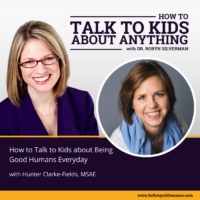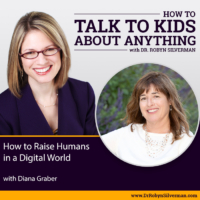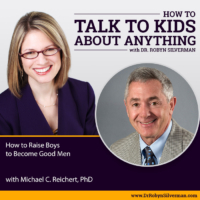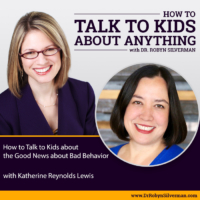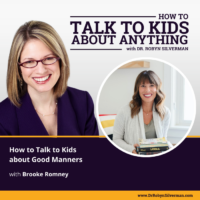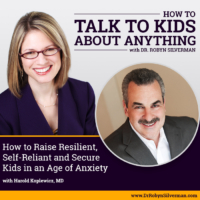Podcast: Play in new window | Download
Subscribe: Apple Podcasts | RSS | More
How to Raise Good Humans
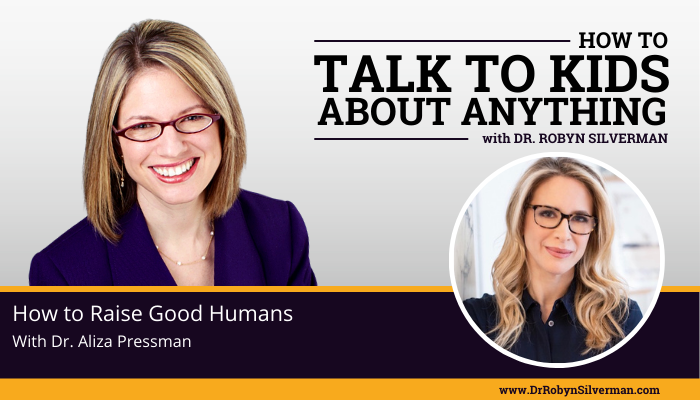
How do we raise good humans? Parents need to know their North Star, have some good tools and be ready to parent for the long haul. Dr. Robyn Silverman interviews Dr. Aliza Pressman on the How to Talk to Kids about Anything podcast.
Special Guest: Aliza Pressman
How do we raise good humans? Do some parents just get lucky with easy children or perhaps they have some kind of special superpower to know what to do? Are there steps to follow or specific things to avoid? We probably all know by now from listening to this podcast and reading all the books that have come with it that we can’t yell, hit, or ignore a child into being “good” so what’s the secret sauce? For this, we have invited Dr. Aliza Pressman on the show today.
BIO
Dr. Aliza is a developmental psychologist with over 15 years of experience working with families. After co-founding SeedlingsGroup and the Mount Sinai Parenting Center, she began the Raising Good Humans Podcast to bring the latest research on child development directly to parents. She’s bringing her expertise and background to listeners every week and starting a new community around evidence-based parenting practices. Dr. Aliza is an Assistant Clinical Professor in the Division of Behavioral Health Department of Pediatrics at Mount Sinai Hospital where she is co-founding director of The Mount Sinai Parenting Center.
Important Messages:
- Figuring out like, what’s your north star? What do you want your kids to say about you or your values when they’re looking back on life, what mattered to you for them and what matters to them. That’s the first thing you need to do so that you always have something to kind of go back to. And then you can say like, in my dealing with this particular challenge, what’s most important? Like in the big picture of things. And if I can figure out lhow is my response aligned with my values, then you can keep yourself from getting swept up in what someone else is saying or pressures from your community that don’t necessarily align with your values or whatever it is.
- I think the first thing is really just getting to know our mission statement.
- How is my response aligned with my values? Then you can keep yourself from getting derailed by what others are saying that don’t align with your values.
- Activity: If you look back, how would you want others to describe you? And then after you’ve just written freely for five minutes, circle the words that stand out for you. It’s a very easy way to find your kind of north star for parenting.
- What are your top three or four values that you really think, if my kid grows up and has a sense of X, y, and Z, I feel like I did the work I needed to do.
- Repair relationships- and forgive yourself when you make mistakes.
- Forcing an apology- meaningless, doesn’t teach you about empathy, just looks like it’s a good thing but it isn’t.
- You can ask yourself like, am I welcoming the feeling? Okay, I’m naming it. You’re feeling this way. You can validate that feeling. And also all behaviors are not welcome. So okay. We can’t, that’s not something I can let you do, even if you’re feeling this way.
- Problem? (1) Name what is observed. (2) What can you do to make things better? (3) I did something that hurt someone else. Not shaming. You did something hurtful. What can you do to make someone feel better? Expand empathy. Might be delayed for a day.
- Recurring: What is setting them up to fail? Maybe not ready for that situation? Throwing sand- not ready for the sand box. Prep in advance. “Remember we keep the sand in the sandbox. We can’t throw it at other people, when we want to throw it, throw it outside of the bucket into the sandbox.”
- Get comfortable, “you’re not ready for that.”
- Parent for the long haul. What do you want for your child to learn for the long haul?
- This is such a long game. These little minutia moments are not meaningful themselves. They’re just laying the groundwork for wiring a different way of responding. And so it’s just so nice to remember- this is a moment. It didn’t go well- we have many other ones. And if our response continues to be in that north star area of this is aligned with my hopes and dreams for this child, I think it works out.
- Big thing lift from parents- is it is so hard and also it’s not that complicated.
- So there’s just like the same answer to almost everything is really hard to believe. It’s hard to believe that it’s like validate the feeling, make sure that you’ve taken that breath, validate the feeling and give specific and clear limits that are appropriate for their age and temperament. Containerize – most complicated question or the most simple question and the answer is pretty much the same.
- If parents could believe that challenging feelings are not the end of the world, and that actually knowing that there is temporary as our happy feelings, we would be a lot more confident as parents. That’s such a, that’s such a moment. This there, I just want highlight that, that they’re just as temporary as those good feelings. They can be fleeting.
- In order to raise good humans, we must know ourselves.
- We kind of get so fixated on raising good humans, but really much of work with parents is our own self-regulation. Like, if you want to know how to raise a kid who’s self-regulated, what do you need? What’s the highly correlated environmental influence on self-regulation for kids, whether their parent is self-regulated So I think raising good humans is really like, you know, it’s not really about kids. Oh my gosh. It’s like, okay, raising good adults
Notable Quotables:
- “Figure out what ‘raising a good human’ means to you because it’s not going to mean the same thing to everyone. Ask yourself, ‘what’s my North Star?’ What do you want my kids to say about you or your values when they look back on their life? What mattered to me for them and what matters to them?”
- “The best tool in your toolkit is to say nothing. Just take a breath and decide how you want to respond.”
- “All feelings are welcome, all behaviors are not.”
- “This is such a long game. These little minutia moments are not meaningful themselves. They’re just laying the groundwork for wiring a different way of responding. Remember- this is a moment. It didn’t go well- we have many other ones. And if our response continues to be in that north star area and aligned with your hopes and dreams for this child, I think it works out.”
- “The big thing I wish I could lift from parents is ‘it is so hard and also it’s not that complicated.’”
- “The same answer to almost everything is really hard to believe. It can be the most complicated question or the most simple question and the answer is pretty much the same. Take a breath, validate the feeling, and give specific and clear limits that are appropriate for their age and temperament.”
- “In order to raise good humans, we must know ourselves.”
- “Raising good humans–it’s not really about kids. It’s raising good adults. Raising ourselves because we are a work in progress.”
The most important skill you can teach your kids about money is that they have choice, says @SmartMoneyMamas on #talktokids podcast. Listen in to get strategies you can use now to teach your kids smart money habits today
Click To Tweet
Resources:
DrAliza.com
Mount Sinai Parenting Center website
IG: @RaisingGoodHumansPodcast
FB: Dr. Aliza W. Pressman
The post How to Raise Good Humans with Dr. Aliza Pressman appeared first on drrobynsilverman.com.

